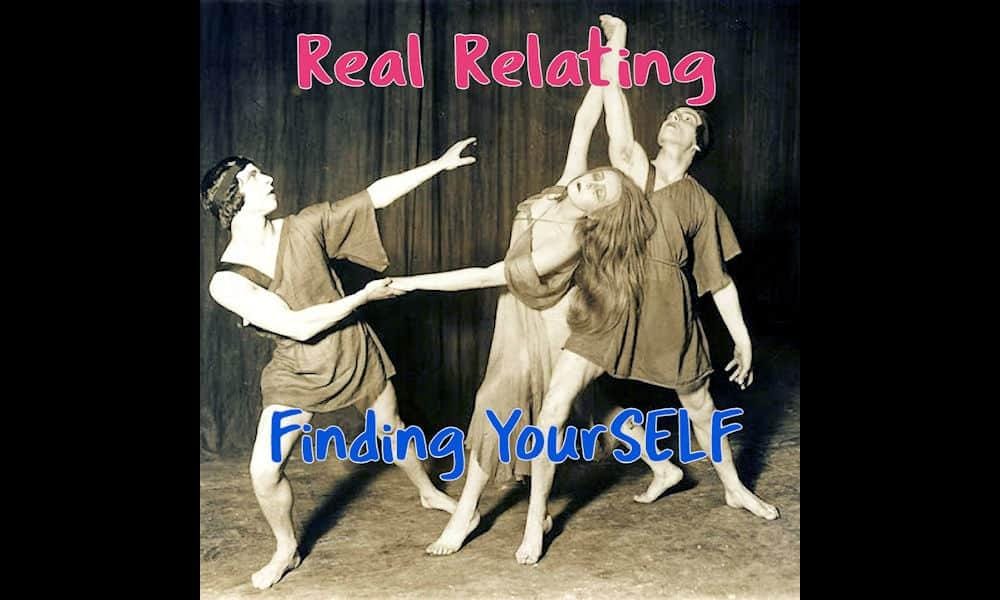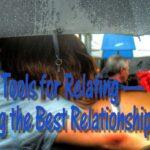- Some Thoughts on Relating — Real Relating
- Relating 101 — Real Relating
- I Wasn’t Going to do This — Real Relating
- Finding YourSELF — Real Relating
- Discover Yourself — Real Relating
Finding YourSELF — Most people enter relationships either for what the other person will (endlessly) give them, or to ‘help.’ Neither approach works.

This Endless Moment
An excellent guide to life and living.
Learn to focus your attention of who you really are.
Purchase all formats from Amazon
Purchase digital versions
(Apple, Nook, Kobo, etc.) from this page
Just a note: I’m pulling quotes from Passionate Marriage, by David Schnarch.
Relationships are funny things. Or, at least the reasons people enter them seem funny.
Our opinion is that relationships are the perfect learning and proving ground for figuring yourself out. Yes, you read that right. YourSELF.
Because like it or not, you are the only person on the planet who can figure you out.

This flies in the face of the traditional belief. Which has always struck me as weird.
Many people get married either to have someone to look after them, or to have someone to blame for who they are and how they are screwing up.
It’s a hard thing to give up on blaming others for what isn’t working in your life — our society loves victims and encourages them to keep being victims.
People love victim-mode; it’s a way to avoid confronting themselves. David Schnarch describes one mode of this as “therapist shopping.”
It often goes like this:
- Client comes in and lists off a tale of woe. Said woe is emphatically external.
- They were parented wrong (who wasn’t?)
- Their partner disagrees with them (whose doesn’t?)
- They’ve had therapy and done a pile of workshops, but their circumstances won’t change (why would they?)
- They’re physically or mentally anxious (part of life)
Now, you’d think that a person in therapy would be there for the long haul, and be would willing to deal with their issues by changing how s/he is acting.
This is often not the case. For many, no matter what brought them to therapy — relationship breakdown, physical symptoms, mental distress — whatever — what many clients are looking for is justification to stay the same.
The goal for them is not self-regulation through discipline. Their goal is symptom removal.
As Schnarch puts it in Passionate Marriage,
…we never doubt that therapists have clever tricks to get us around our problems without going through them. Few of us enter therapy to change ourselves — we are usually seeking ways to change our situation or our spouse, while we remain the same. We seek out simple tips, techniques, and benedictions that tell us how to communicate and be compassionate (read: easy ways to feel understood and receive compassion.) pg. 322
To restate: any people get married either to have someone to look after them, or to have someone to blame for who they are and how they are screwing up.
I remember having one session with a couple. They were separated. He described himself as “controlling,” and as the session went on, all he would talk about was what he needed from his wife.
He was lonely, he was unhappy; he needed his wife to end the separation, come home and look after him. He told me that he had done 2 sessions of anger management… and now he had been to couples therapy. He figured he had done his part
He concluded with how badly he needed her to look after him, to affirm him, and to tell him he was a good and worthwhile person. Oh. And how she needed to let him be as he was; angry, unstable and controlling.
I was pleased to note that she was not biting on his neediness, and was not rushing home. She was holding her ground.

He had pushed her a few months earlier, and she wanted to talk about her fear of him.
He laughed it off. Said she was painting him as being violent. That normally he only yelled and threatened — the push was a fluke. He reminded her that he had done “2… 2! anger management sessions!”
She went inside, calmed herself, and said, “I hear that you’re hurting, and I’m not coming home until I feel safe.”
Boy, did he piss himself off over that one. (I guess those 2 whole sessions of anger management hadn’t “taken,” eh?) He yelled, he cajoled, he paced.
Then, he decided to come after me. He told me in no uncertain terms that he was angry with me because (it had been 30 minutes, after all…) I wouldn’t help him get his wife to come home… to understand that she should have nothing better to do than endlessly try to make him happy.
It was clear by then that I was heading in the opposite direction — I’d suggested a 3‑month trial separation, with each of them doing individual therapy. I’d said that I thought that both would benefit from growing up, getting over themselves (she wasn’t off the hook — she was an enabler and needed to look deeply at her enabling behaviours) and standing on their own two feet.
The man paced the office: out to the waiting room, back and forth. He shouted that all of his friends thought that his wife had an “imbalance of power.” (He meant: “I’m supposed to be in charge here. How dare she assert herself and not look after me?”)
I said that I got it that he didn’t like the situation: that his wife was learning to look after herself. I then said that it was not her job to look after him… it was his job to look after himself.
He said, “This is not how therapy is supposed to be going! She’s supposed to see that I did what she asked (2 anger management sessions, 1 session of therapy…) and come home.” (Read: “Wayne, if you were doing your job, you’d tell her to come home.”)
He knew I was a former minister, so he trotted out, “Show me in the Bible where it says that I should stand on my own feet, and that my wife shouldn’t look after me!” I just smiled and repeated myself. He kept shaking his head and muttering, “You’re not doing this right!”
They booked another session. Quoth the woman, “This has been great!!!” Husband glowered.
Several days later he called and cancelled the next session. He had decided that they would get counselling at their church, where, I am sure, he hoped to find a Minister who had read the same Bible he had invented.
My only regret was that she went along with him. I would guess that his manipulations finally caused her to give up on her self and return to “doing it his way.”
Problem is, as long as one partner tries to control the other, the relationship is doomed. Or as Schnarch puts it,
Long-term intimacy within marriage hinges on validating yourself rather than “trusting” your partner to make you feel safe. Pg. 113
To repeat what I said above, my life is not about me understanding other people. Nor is my life about demanding that other people understand me. My job is to figure myself out.

I can listen as others choose to self-reveal. I can even attempt to help others cut through the bullshit they tell themselves.
One of the biggest is, “I just gotta be me!” Nothing holds you back more that “being yourself.” Being yourself is code for “I refuse to do the hard work of shifting what isn’t working. Being yourself has led you to where you are right now.
We all need to get over “being me,” and decide to grow up.
Growing up means hearing hard truths about ourselves (which our partners definitely will point out to us — this is the real reason for being in a relationship in the first place — for the feedback!)
- Rather than get defensive and run around whining about being ill-treated, I go inside, and self-soothe.
- Once I’m calm, I choose to look at the criticism and decide if my behaviour needs changing.
- I then choose to change, not for the other person, but for myself.
Schnarch: My point is: communication is no assurance of intimacy if you can’t stand the message. “Good communication” is often mistaken for your partner perceiving you the way you want to be seen or understood. “We don’t communicate” is code for “I refuse to accept that message — send me a different one! How dare you see me [or the issue] that way!” pg. 102
In my book, This Endless Moment 2nd. edition, I wrote:
The Kayak
This is one of my favourite stories and is my take on an illustration David Raithby used in a workshop at The Haven.
My life consists of me, sitting in my one-person kayak. I am bobbing along, paddling along, on a relatively calm ocean, in the dark. I do not know where I am, or where I am going. I am “present” in the paddling, and nowhere else, as there is nowhere else.
Every now and again, I meet up with another paddler, and we get to choose whether to paddle together. We still don’t know where we are or where we are going, but we are no longer lonely. I am, however, and this is key, still alone.
A single kayak is an interesting boat. There is only room for one. No one can climb in with me, no one can take over for me, and no one can paddle my kayak for me. I am alone in my kayak, even if other boats surround me. Whining about how unfair all of this is, how I need help, how I want someone to please take over for me, isn’t going to accomplish anything, as no one can step in and bail me out.
What I can do is watch others paddle, and they can watch me. I can learn from others, and others can learn from me. Now, someone watching me paddle will see how I do it, and then they might try to duplicate my stroke, from their boat. The best they will ever do, however, is their version of my paddle stroke. They can’t be me; they can’t be like me. They can only watch and learn and do it their way.
This is the reality of life: we are born and die alone, and the rest of life is a solo job in a crowd. This is either terrifying or freeing. I’ll scare myself with it precisely to the degree that I refuse to accept responsibility for my life. I will free myself precisely to the degree that I allow myself the personal satisfaction of paddling just a little more efficiently and effortlessly each day.
There will be calm days and stormy days, and days when I’m swamped and flipped over. I can drown or I can get right side up. Whining about how unfair that is only delays getting back to paddling, which is the only “truth” of my life.
In other words, I can see my life as a lesson in elegant paddling and I can learn all there is to learn about paddling well. A silly choice would be to feel sorry for myself that I must paddle. Another silly choice would be to spend my days assigning blame to others for not rescuing me or teaching me “right,” or for “abusing me” by not treating me as special or whatever. For the ultimate in silly, I can simply give up, depress myself and stop paddling-and get blown wherever the wind takes me.
Deciding to paddle well, to accept that “the way it is, is the way it is,” is the enlightened choice. I want to be the best me I can be, and that’s totally about me-about what I choose to learn and do.
Further, I can choose to paddle with others who get this, and the paddle will be full of sharing and compassion and learning. Or I can choose to paddle alone and learn more of me.
I mean, what other option is there? It’s not like griping about “how life is” changes anything, after all. You have noticed that, haven’t you??
There’s the joy of the paddle and smart vs. dumb choices. The dumb choice is to make a drama out of the paddle and make myself miserable.
And isn’t it funny that most people pick drama over the joy of the paddle?
In my little boat, I am alone, and self-responsible. No one is “supposed” to make it all better for me. That’s my job.
Given that, what of relationships?
Darbella is in her boat, too. I can’t do anything for her. We can, however, choose to paddle along together, and keep each other company. I reveal to her what I know about myself, and especially the embarrassing, stupid, messy parts.
She may choose to do the same, although it’s not a requirement.
Here’s the important part: I choose who I paddle with… and I choose to be with someone who is choosing to self-reveal to me.
It is impossible to live life free of anxiety. There is the anxiety of relating — which requires change, and pain. There is the anxiety of trying to stay the same, in denial, pretending.
The fire of true relating, to me, seems the better choice.





